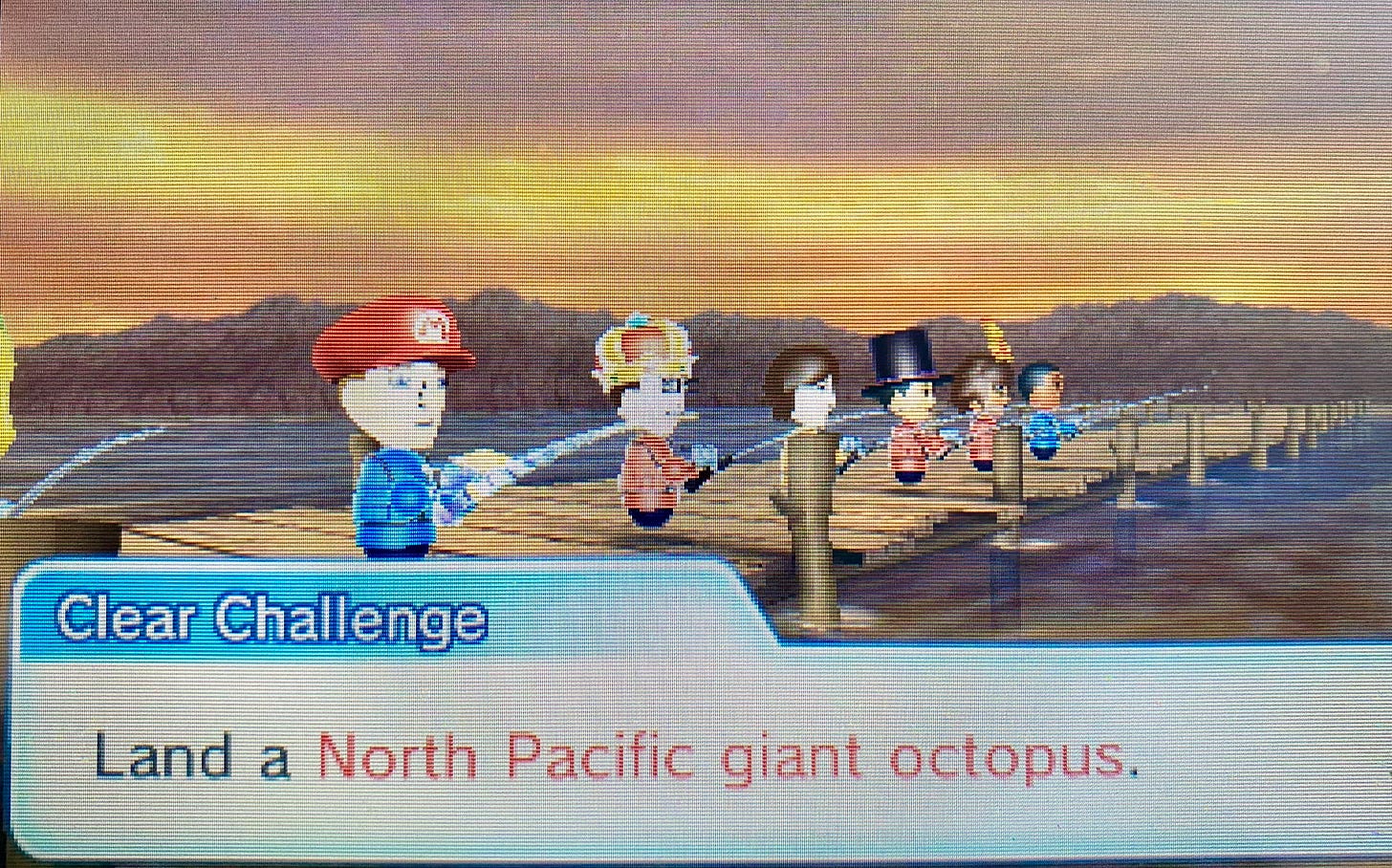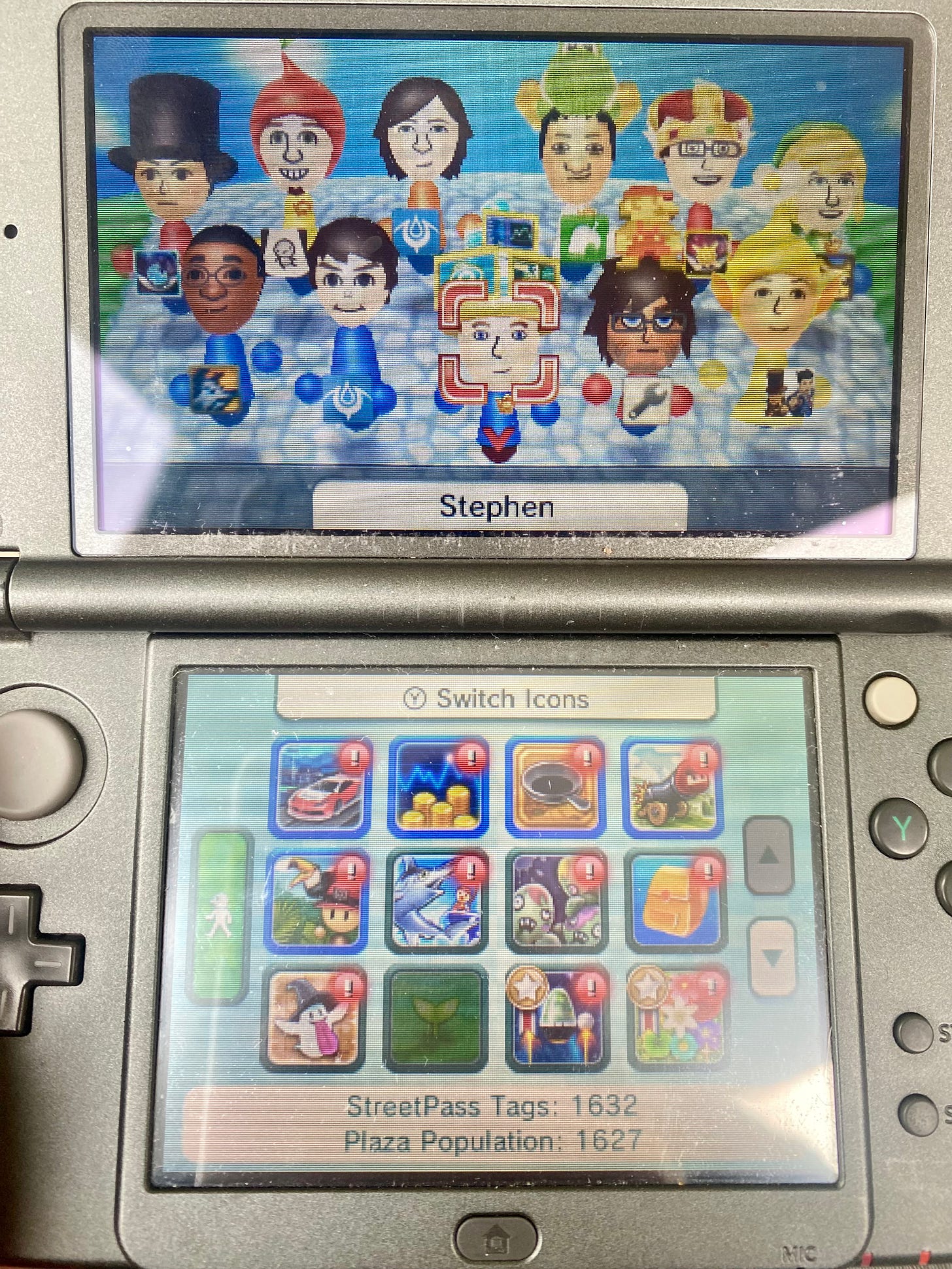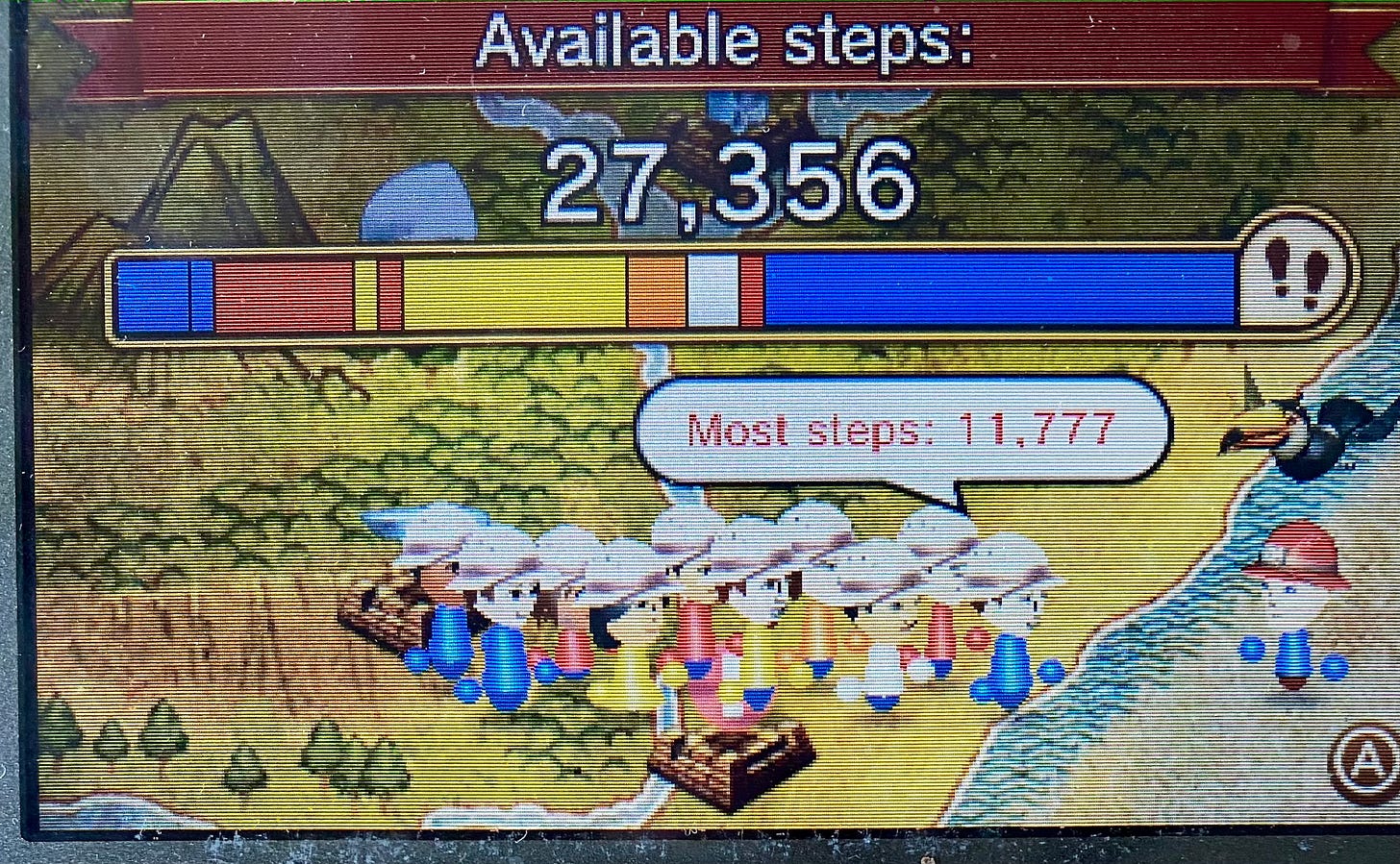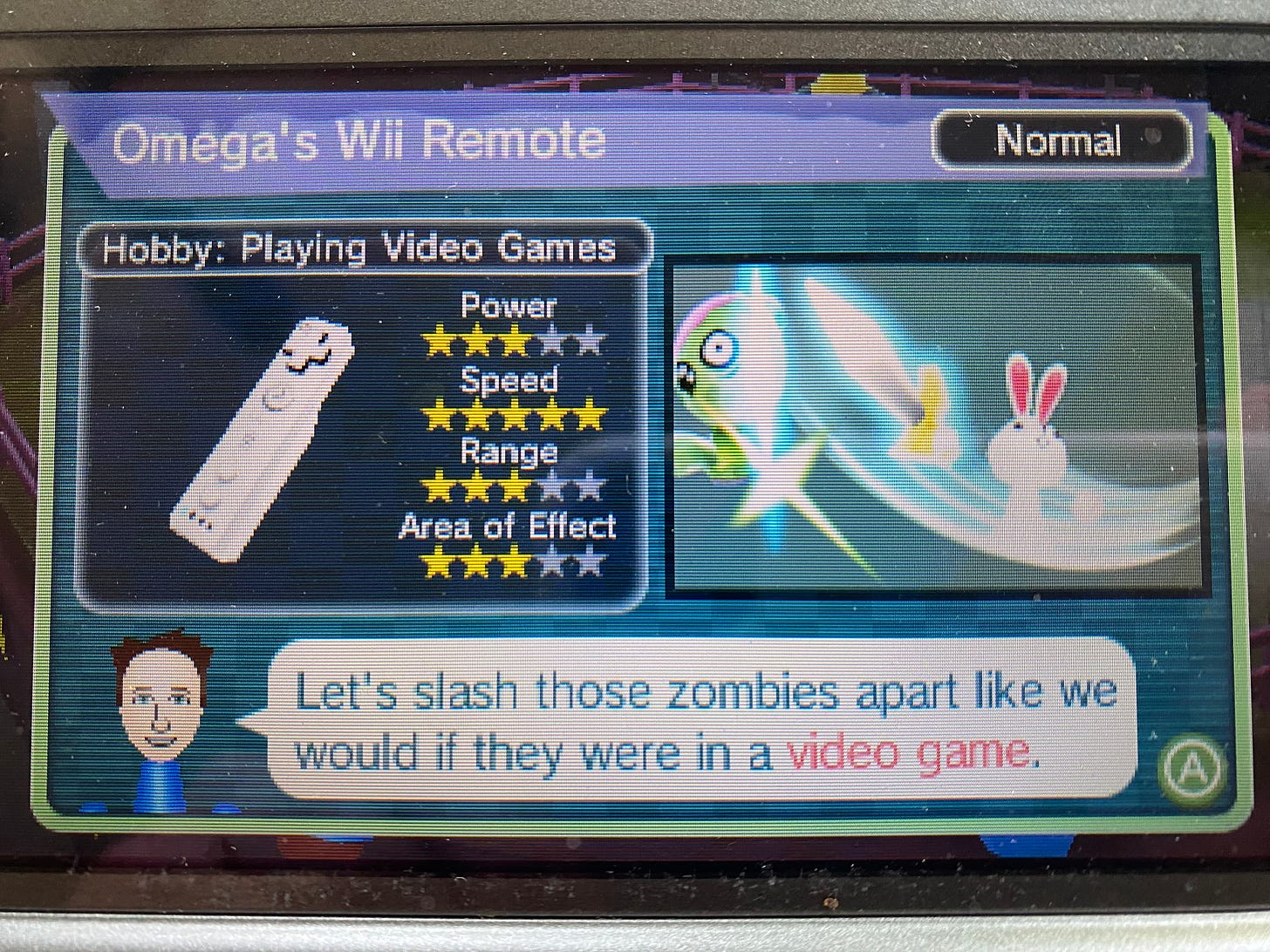Nintendo’s innovative, ingenious, nearly extinct StreetPass games
An unusual blend of single- and multiplayer that Nintendo never brought to the Switch.

In today’s era of interactive entertainment, you can play video games on your own, or with a friend sitting next to you on a couch, or online against players around the world.
But for a brief period, a decade ago, there was another option: you could play a dozen Nintendo-published games that you operated solo but that were, for lack of a better word, powered by people you’d passed by in the real world.
They were called StreetPass games, and they involved topics as diverse as zombie survival, cooking and stock market day-trading.
You can’t buy them today, and if you have them on the Nintendo 3DS, the lone system that supported them, they’re hard to play. They were designed for a world that was full of 3DS players going to work and school and zoos and baseball games. We’re not in that world any more.
That’s a shame. The StreetPass games are some of the most original experiences ever published by Nintendo, a stand-out example of what happens when a gaming platform company crosses its hardware and software goals in an experimental way.
Now, even Nintendo has moved on. They literally do not make games like this any more.
To avoid getting any StreetPass fans’ hopes up, there’s no big news hook for this article, no big StreetPass anniversary or rumors of StreetPass support coming to Nintendo’s Switch successor (if only!).
I was inspired simply by turning on my old Nintendo 3DS XL for the first time in 10 months and realizing I had a precious, fleeting chance to play these games again. The preservation of games is increasingly paramount these days, as more titles are discarded. With StreetPass, the preservation issue is a bit different. There are no servers for Nintendo to turn off to deactivate them. There just aren’t many people walking around with 3DS systems anymore. To enjoy these games, you need that. That’s what I was thinking about when I saw 10 little Mii avatars pulled from other people’s systems, queued in my 3DS, ready to be used in my games. This might be the last chance I get to do this.
Note: I’ve been into the StreetPass games for a while. In 2013 I conducted what I believe is the only interview Nintendo ever did about any of them.

If you missed out or have forgotten, let me explain what StreetPass was: The portable Nintendo 3DS system was launched in 2011 (and discontinued in 2020) with the ability to wirelessly communicate with other 3DS systems, even while it was in sleep mode. That wireless communication, dubbed StreetPass, would automatically connect to nearby systems to exchange a batch of personalized info tied to a user’s “Mii” avatar: their username, birthdate, Mii, the color of their Mii’s shirt, their hobby, the region they live in, etc. In the heyday of the 3DS (76 million units sold lifetime), you could throw the system in your bag, walk around a city, an airport, or some other crowded area, and you’d probably pick up a batch of StreetPasses. StreetPass did not work online. You had to be physically near someone to get their StreetPass data.
The 3DS launched with one StreetPass game baked inside. Find Mii was a simple role-playing game in which the player leads a party of warriors composed of Miis grabbed from StreetPassing with other people’s systems. Back in 2013, Nintendo producer Kouichi Kawamoto told me that Find Mii got its start “from our drive to make players feel like they accomplish something by using StreetPass.”
As with later StreetPass games, you played Find Mii solo. The other Miis may have been pulled from other players’ systems, but those players had no control of them (and were likely long gone before the Find Mii player even accessed their characters). As with the later games, you could use 10 newly StreetPassed Miis at a time, max.
In Find Mii, the collected Miis march forward and battlea few enemies until exhaustion. Then you hope to StreetPass with more systems to gather more Miis to continue the quest. Miis you encounter repeatedly are more powerful.

In 2013 and again in 2015 and 2016, Nintendo released waves of other StreetPass games that explored the potential of the format. All were developed by small Japanese studios such as Grezzo and Arzest and published by Nintendo. (One of Nintendo’s most frequent StreetPass collaborators, Good-Feel, just developed the Switch game Princess Peach Showtime).
The new games made creative use of the personal preference data—a player avatar’s shirt color, their country of origin, even their hobbies—that was ferried in a StreetPass exchange. Keep in mind that players had set that personal data just for their Mii, usually with no idea how their choices would impact future games where their Miis appeared.
In Mii Force, a sci-fi shoot-em-up from Good-Feel, players fly a spaceship through levels filled with enemies and a smattering of pods containing other people’s Miis. Flying into a pod rescues the Mii and turns them into part of your ship’s arsenal. Each Mii can fire a weapon, based on the color of their t-shirt. A red shirted Mii shoots fire; a blue one fires seeker missiles; etc.
In Warrior’s Way, a game from Spike Chunsoft about large-scale battles, collected Miis bring troops with them. The more Miis those other players have encountered on their systems, the bigger the armies they bring.
In Market Crashers, a day-trading game from Good-Feel, the player purchases fake shares of stock tied to the other StreetPass games—you can invest in the spaceship company from Mii Force, for example—and then watch the company’s stock price fluctuate across a simulated day. Buy low; sell high. Collected Miis perform the role of stock analysts, offering predictions about how the price will change.
In Battleground Z, an elaborate zombie combat game from Good-Feel, the player fights hordes of zombies, while collected Miis hand off weapons tied to their creator’s listed hobby. If you StreetPassed with someone who loved playing video games, for example, their Mii hands your character a large Wii remote to use as a sword. A player who said they like to dance would offer a disco ball, which lets you defeat zombies in a dance-off. (Here’s the very creative, hobby-based weapon list.)
In Mii Trek, a safari/exploration game from Arzest, a stat pulled in from other Miis—I’m not sure which—determines how many steps your party can walk through the jungle as you hunt treasures, photograph exotic birds and tranquilize angry pumas.
In Ultimate Angler, a fishing game from Prope that has my favorite StreetPass implementation, other Mii’s shirt colors determine the type of specialized bait you can use to fish. Better: The location where the Mii’s owner is based can grant special tickets to unlock more remote fishing spots. A U.S.-based player can get a silver ticket if they connect with Miis from other states. Connecting with a Mii made by a gamer from another country grants a gold ticket and access to the game’s most distant fishing locale. In the glory days of the 3DS, Ultimate Angler was the most rewarding video game to take on international trips.
Nintendo’s support for StreetPass games ended a long time ago. Its final StreetPass games were released in 2016, three years before the company stopped releasing traditional games for the 3DS.
Even if you have a 3DS, you can’t buy the games anymore. They were digital-only, and Nintendo shut down its 3DS online shop last year. The 3DS’ successor, the Switch, doesn’t support StreetPass.
It is now much harder to play the StreetPass games, but, if you have them, it’s not impossible. Unlike online multiplayer games, there are no connectivity servers to worry about. The act of doing a StreetPass isn’t dependent on a network Nintendo can shut off. It just depends on there being a real-life population of people walking around with 3DS systems ready to StreetPass.
The catch, of course, is that very few people carry a Nintendo 3DS these days. That’s why I was pleasantly surprised to discover earlier this month that I still had some Miis collected on my 3DS waiting to be used in StreetPass games. It’s why I realized, with some sadness, that I probably wouldn’t collect a new batch of them any time soon.
Minor caveat: There is a way to play StreetPass in isolation. The games I described above offer an alternative way to add Miis by cashing in “play coins” that are earned by walking around with the 3DS and having your steps counted by the system’s pedometer. The Miis you grab that way are less interesting, and there’s none of the magic of scoring the right weapon or perk because you happened to be near someone who had an ideal hobby or whose Mii wore a yellow shirt.
Back in 2013, I asked Nintendo’s StreetPass producers if the games were the result of their company’s business priorities. After all, it was in Nintendo’s interest to have 3DS owners see value in a world where everyone nearby also has a 3DS.
“There might be a business element behind including the StreetPass functionality itself,” Kawamoto told me. “But we didn't think much about the business perspective when coming up with StreetPass Mii Plaza's gameplay.
“What we focused on was what we could do to make bringing your Nintendo 3DS outside more fun.”
Item 2: In brief…
😲 Battlestate Games angered fans of its popular Escape from Tarkov extraction shooter last week by offering a $250 version of the game with an exclusive mode that wasn’t available to purchasers of a $150 version that previously granted access to the game’s new add-ons, PC Gamer reports.
A partial walk-back will let those $150-version players access it, but with negative impacts on those with the more basic $50 version.
🤔 The most popular mods for the PC version of Fallout 4 are those that roll back the game’s recently released next-gen patch VG247 reports. Some players are unhappy about the patch’s limited improvements and incompatibility with popular player mods.
👀 Influencer/esports group FaZe Clan has purged most of its roster over the weekend, paring its line-up to 14 members, Kotaku reports.
🧱 Manor Lords, the medieval city-building and warfare game from solo dev Slavic Magic, had a great first weekend in Steam early access, selling more than a million copies and reaching 170,000 peak concurrent players, per publisher Hooded Horse. (Read Game File’s profile of the upstart publisher.)
🎮 Microsoft will offer games from small Chinese publisher Gamera as part of its Game Pass subscription, the company announced today as part of an ID@Xbox showcase and in another sign of China’s game-makers getting in front of more console players in the West.







I love this story. Walking around the big convention DragonCon in Atlanta a decade ago would fill up your StreetPass faster than you could possibly play through the games. It was really fun. I bet this could remain a trend within video game conferences if you made a push for it.
I'm really compelled by the fact that this is a peer-to-peer system, and therefore durable to the whims of a company not wanting to pay for server upkeep. That feels rare and special, and worth preserving in spirit.
I wonder if the Playdate can do something like this...
I would love if Nintendo had some Streetpass successor in the next Switch. I would gladly carry around a joycon or something like the Pokeball Plus for it to work